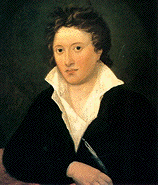August 4: The Necessity of Shelley
Percy Bysshe Shelley (1792)
It was on this date, August 4, 1792, that the third-greatest British poet, Percy Bysshe Shelley, was born at Field Place near Horsham, the son of a Member of Parliament. Along with developing a strong dislike for political tyranny, after reading the radical writings of Thomas Paine, William Godwin and Baron D'Holbach, he became an Atheist and a Materialist – a position he maintained throughout his creative life. He was educated at Eton, where he was known as "Shelley the Atheist," and at Oxford.
While at Oxford, Shelley wrote in defense of Daniel Isaac Eaton, a bookseller charged with selling books by Thomas Paine. In a pamphlet called The Necessity of Atheism, he attacked compulsory Christian practice. In it, Shelley wrote this gem (after D’Holbach): "If God has spoken, why is the world not convinced?" So shocked was Oxford that Shelley was expelled on 25 March 1811.
His first important poem was Queen Mab, published in 1813, and in it Shelley is especially critical of religion. First the "Spirit" speaks:
SPIRIT
'I was an infant when my mother went
To see an atheist burned. She took me there.
The dark-robed priests were met around the pile;
The multitude was gazing silently;
And as the culprit passed with dauntless mien,
Tempered disdain in his unaltering eye,
Mixed with a quiet smile, shone calmly forth;
The thirsty fire crept round his manly limbs;
..."Weep not, child!" cried my mother, "for that man
Has said, There is no God."'
Then the "Fairy" takes up the narrative:
FAIRY
...'The name of God
Has fenced about all crime with holiness,
...Earth groans beneath religion's iron age,
And priests dare babble of a God of peace,
Even whilst their hands are red with guiltless blood,
Murdering the while, uprooting every germ
Of truth, exterminating, spoiling all,
Making the earth a slaughter-house!
Later, Ahasuerus takes up the narrative:
AHASUERUS
'Is there a God!—ay, an almighty God,
And vengeful as almighty! Once his voice
Was heard on earth; earth shuddered at the sound;
The fiery-visaged firmament expressed
Abhorrence, and the grave of Nature yawned
To swallow all the dauntless and the good
That dared to hurl defiance at his throne,
Girt as it was with power.
Shelley was equally skeptical in his greatest poem, the lyrical drama Prometheus Unbound (1820). In the first act, the Earth speaks to Prometheus:
THE EARTH
I dare not speak like life, lest Heaven's fell King
Should hear, and link me to some wheel of pain
More torturing than the one whereon I roll.
Subtle thou art and good; and though the Gods
Hear not this voice, yet thou art more than God,
Being wise and kind: earnestly hearken now.
Shelley fell in love with the beautiful and accomplished daughter of William Godwin and Mary Wollstonecraft, lived with her until his wife died, then married her – the future author of Frankenstein. With Mary in Italy, Shelley wrote some of his greatest works. Percy Bysshe Shelley once said, "It is easier to suppose that the universe has existed for all eternity than to conceive a being beyond its limits capable of creating it."* On 8 July 1822, while attempting to sail from Leghorn to Le Spezia, Italy, Shelley was drowned in a storm. It was shortly before his thirtieth birthday.
* A Letter to Lord Ellenborough, 1812.
Originally published August 2003 by Ronald Bruce Meyer.


